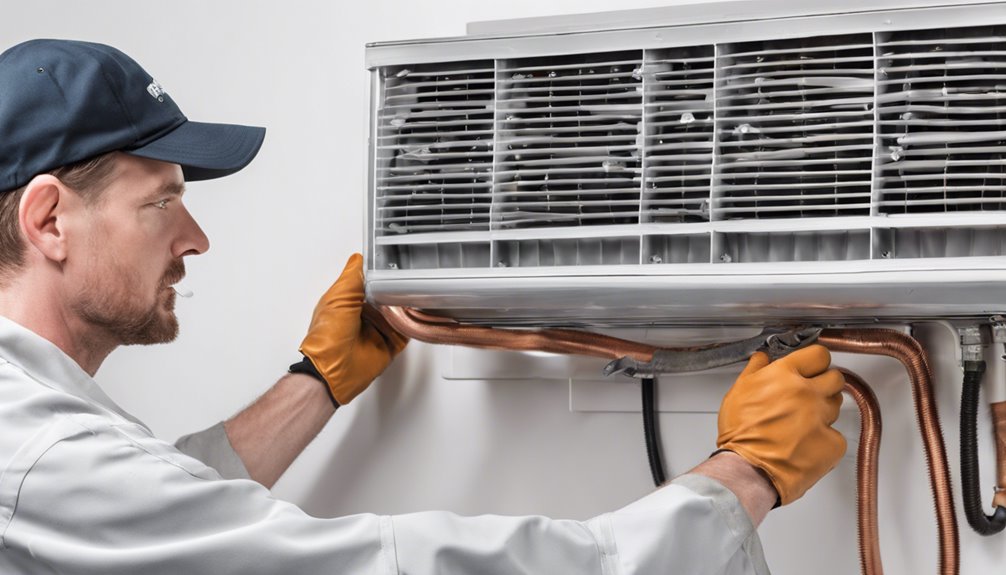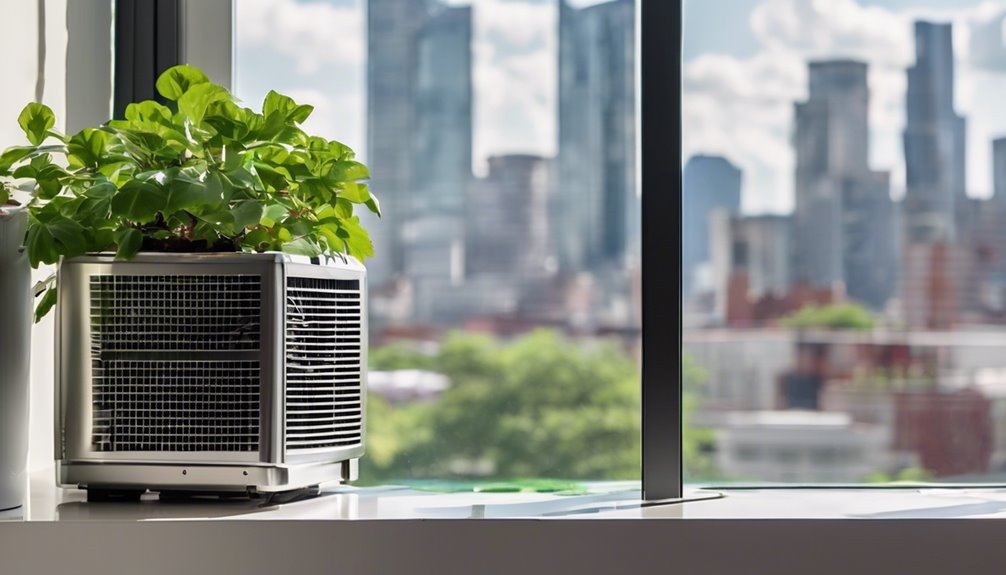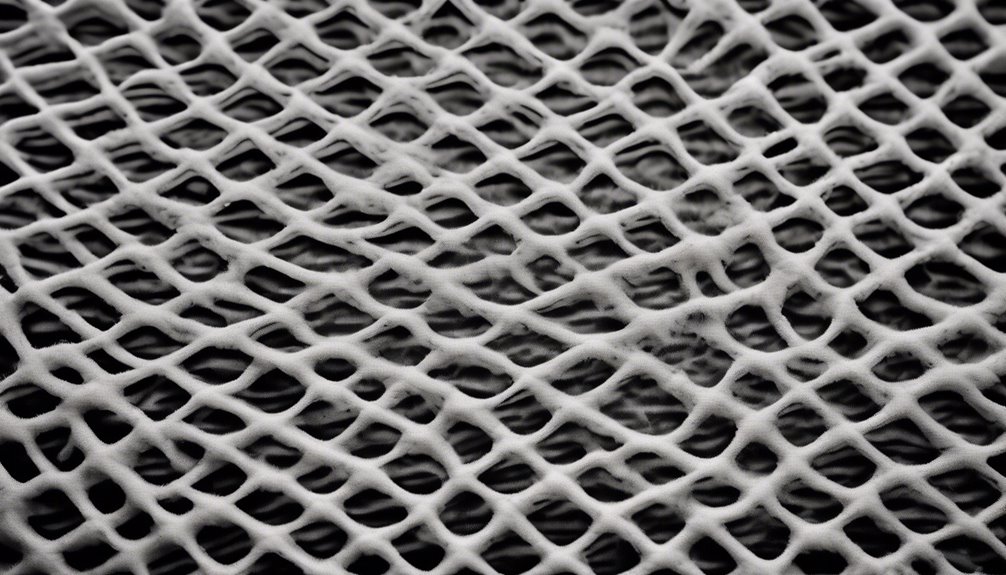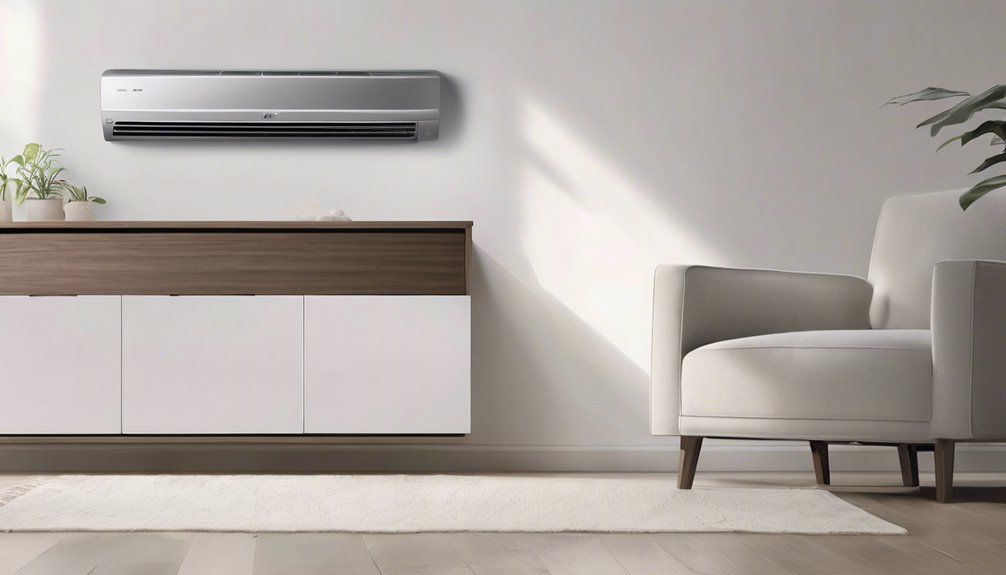When getting an air conditioner installed, you're likely wondering what drives the cost. Well, there are five key factors at play. The size and type of unit you need, installation complexity, location and accessibility, permits and inspection fees, and additional features and upgrades all impact the final bill. Understanding how each of these factors contributes to the cost will help you budget accordingly and make informed decisions. Take a closer look at each of these factors to get a better handle on what you'll be paying.
Key Takeaways
- Unit size and type impact installation cost, with larger or more complex units increasing expense.
- Installation complexity varies depending on custom ductwork, insulation needs, and electrical system modifications.
- Location and accessibility affect cost, with difficult terrain, city zoning laws, and hard-to-reach locations adding to the price.
- Permits and inspection fees, ranging from $50 to $500, are necessary and vary by location and installation type.
- Additional features and upgrades, such as smart integration and advanced filtration, increase cost but provide long-term benefits.
Unit Size and Type
Choose the right air conditioner unit size and type for your space to ensure efficient cooling and cost-effective operation.
A unit that's too small won't cool your space effectively, while one that's too large will waste energy and increase your bills. Determine your tonnage requirements based on your space's size, insulation, and number of windows.
Look for a unit with a high SEER (Seasonal Energy Efficiency Ratio) rating, which measures its energy efficiency. A higher SEER rating means lower energy consumption and costs.
Consider your climate and cooling needs when selecting a unit type, such as a window unit, split system, or central air conditioner. By choosing the right unit size and type, you'll enjoy efficient cooling and save money on your energy bills.
Installation Complexity
Air conditioner installation complexity can vary significantly depending on your specific situation.
If your home requires custom ductwork, for instance, it'll increase the installation cost. This is because custom ductwork needs to be designed and built to fit your home's unique layout, which takes more time and materials.
Additionally, if your attic lacks sufficient insulation, the installation team may need to add insulation to ensure the AC unit works efficiently. This adds to the overall cost.
You may also need to modify your electrical system to support the new AC unit, which further complicates the installation process. All these factors contribute to a more complex and expensive installation.
Location and Accessibility
The location of your air conditioner unit can significantly impact the installation cost and complexity.
If you live in a densely populated city, city zoning laws may restrict the placement of outdoor units, requiring more complex and expensive installations.
On the other hand, if you live in a rural area, the remoteness of your location may increase travel costs for the installation team, also driving up the price.
You may need to pay more for longer pipes or specialized equipment to navigate difficult terrain.
Additionally, installing a unit in a hard-to-reach location, such as a rooftop or a basement, will likely cost more than a straightforward installation on a ground-level floor.
Permits and Inspection Fees
Obtaining necessary permits and passing inspections are crucial steps in the air conditioner installation process, and they come with associated fees that add to your overall cost.
These fees vary depending on your location and the type of installation you're having. You'll need to comply with municipal regulations and local ordinances, which can be complex and time-consuming.
Your installer will typically handle the permit process, but you'll still be responsible for the costs. Expect to pay anywhere from $50 to $500 or more, depending on the complexity of the installation and the jurisdiction.
Be sure to factor these fees into your budget to avoid any surprises down the line.
Additional Features and Upgrades
You can enhance your air conditioner installation with various additional features and upgrades that improve performance, efficiency, and convenience.
These upgrades can increase your system's energy efficiency, saving you money on utility bills. Consider smart integration, which allows you to control your AC remotely through an app, schedule maintenance, and receive alerts for optimal performance.
Other upgrades include advanced filtration systems, humidistats, and zone control systems. These features may add to the overall cost of your installation, but they can provide long-term benefits and increased comfort.
Be sure to discuss your options with your installer to determine which upgrades are right for you and your budget.
Frequently Asked Questions
Can I Install an Air Conditioner Myself to Save Money?
You're considering installing an air conditioner yourself to save money, but be aware of the DIY challenges, like complex electrical connections and sizing issues, which can lead to safety risks and decreased efficiency, whereas professional benefits include warranty coverage and optimal performance.
How Long Does a Typical Air Conditioner Installation Take?
When you hire a pro, you'll want to know how long the installation takes. Typically, it'll take around 4-8 hours, depending on time constraints and labor complexity, so plan accordingly and clear your schedule for the day.
Can I Replace My Old AC Unit With a New One of the Same Size?
You can replace your old AC unit with a new one of the same size, but consider upgrading to a higher SEER rating for better energy efficiency, which can save you money in the long run.
Do I Need to Replace My Thermostat During AC Installation?
When installing a new AC unit, you'll need to check if your old thermostat is compatible with the new system. If not, you'll need a thermostat upgrade, which can add to the overall cost, but ensures optimal performance and energy efficiency.
Can I Get a Discount for Installing Multiple AC Units at Once?
You're likely wondering if installing multiple AC units at once can score you a deal. The answer is yes! You can negotiate a bulk discount for simultaneous installation, potentially saving you hundreds or even thousands of dollars.
Conclusion
So, you're ready to install a new air conditioner! Remember, the final cost will depend on several factors, including the unit's size and type, installation complexity, location and accessibility, permits and inspection fees, and any additional features or upgrades you want. By considering these factors, you'll get a better sense of what to expect and can plan your budget accordingly. This will ensure a smooth and stress-free installation process, and you'll be enjoying cool comfort in no time!



